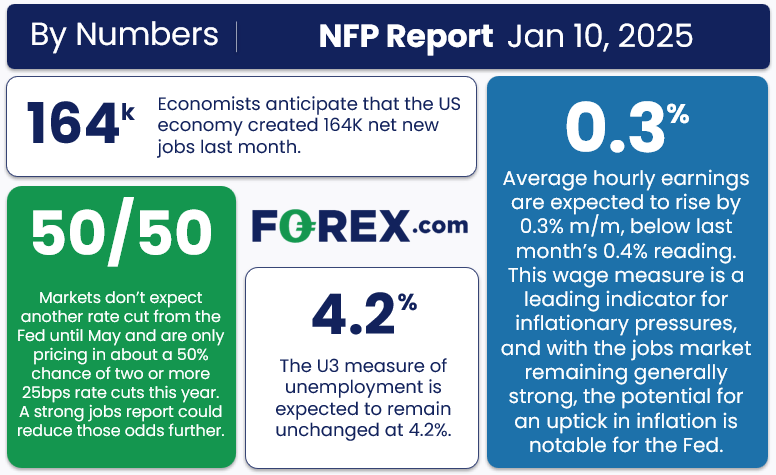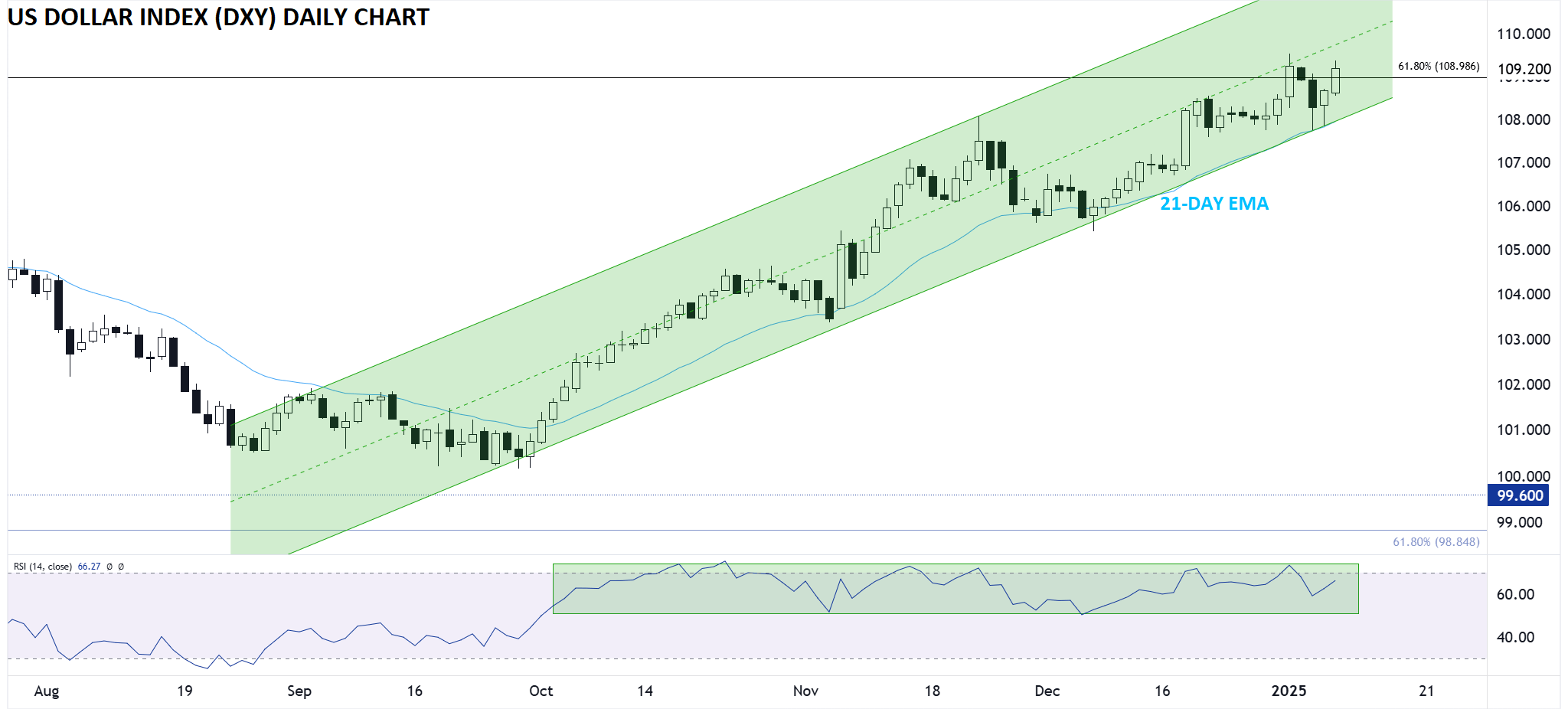
NFP Key Points
- NFP report expectations: +164K jobs, +0.3% m/m earnings, unemployment at 4.2%
- Leading indicators point to a roughly as-expected reading in this month’s NFP report, with headline job growth potentially coming in somewhere in the 150-200K range
- The US Dollar Index (DXY) continues to trend higher, suggesting any jobs-related weakness may be short-lived.
When is the December NFP Report?
The December NFP report will be released on Friday, January 10, at 8:30 ET.
NFP Report Expectations
Traders and economists expect the NFP report to show that the US created 164K net new jobs, with average hourly earnings rising 0.3% m/m (4.0% y/y) and the U3 unemployment rate holding steady at 4.2%.
NFP Overview
Last month’s jobs report “beat” expectations in terms of total job growth and revisions to past estimates, but much of that strength can be attributed to a rebound from previous weather-related disruptions. More to the point, the household survey was relatively weak, leading to a falling participation rate and an uptick in the unemployment rate (to 4.0%).
For this month, expectations are more tepid, with economists expecting “only” 164K net new jobs and the unemployment rate to hold steady at 4.2%. One key area to watch will be the average hourly earnings measure, which has ticked higher in recent months, fueling concerns about accelerating pay growth and potentially limiting the Federal Reserve’s scope to cut rates further if it continues:

Source: StoneX
As the lower left box below suggests, traders are skeptical that the Fed will deliver much in the way of additional interest rate cuts this year, with only one 25bps reduction expected in the first half of the year and only about a 50/50 chance of a second cut in the latter half of 2025. With a handful of jobs and inflation reports still to come before the proverbial “rubber meets the road” for the US central bank, this week’s jobs report may not be as market moving as other, more immediately impactful releases.
NFP Forecast
As regular readers know, we focus on four historically reliable leading indicators to help handicap each month’s NFP report:
- The ISM Manufacturing PMI Employment component fell to 45.3 from 48.1 last month.
- The ISM Services PMI Employment component held steady at 51.4 from 51.5 last month.
- The ADP Employment report showed 122K net new jobs, down 146K last month.
- Finally, the 4-week moving average of initial unemployment claims fell to an historically strong 213K from 218K last month.
Weighing the data and our internal models, the leading indicators point to a roughly as-expected reading in this month’s NFP report, with headline job growth potentially coming in somewhere in the 150-200K range, albeit with a big band of uncertainty given the current global backdrop.
Regardless, the month-to-month fluctuations in this report are notoriously difficult to predict, so we wouldn’t put too much stock into any forecasts (including ours). As always, the other aspects of the release, prominently including the closely-watched average hourly earnings figure which came in at 0.4% m/m in the most recent NFP report.
Potential NFP Market Reaction
|
|
Wages < 0.2% m/m |
Wages 0.2-0.4% m/m |
Wages > 0.4% m/m |
|
< 130K jobs |
Bearish USD |
Slightly Bearish USD |
Neutral USD |
|
130-200K jobs |
Slightly Bearish USD |
Neutral USD |
Slightly Bullish USD |
|
> 200K jobs |
Neutral USD |
Slightly Bullish USD |
Bullish USD |
As we outline below, the US dollar has risen to test its highest level in more than two years, but the recent pause near those highs has kept the pair from heading into NFP in an overbought state. Overall, the balance of risks is relatively evenly distributed in the short-term, leading to the balanced scenario analysis above.
US Dollar Technical Analysis – DXY Daily Chart

Source: TradingView, StoneX
The US Dollar Index (DXY) hit a 2+ year high late last week before pulling back down to bullish channel support to start this week. After bouncing through the middle of the week, the greenback is near the middle of its rising channel.
While a notably better- or worse-than-expected jobs report may lead to a short-term bullish or bearish reaction in the US dollar respectively, the dominant feature of the chart remains the established uptrend, suggesting that any near-term dips may be quickly bought up off support in the 1.0800 area as long as the fundamental outlook for the US economy doesn’t change dramatically.
-- Written by Matt Weller, Global Head of Research
Follow Matt on Twitter: @MWellerFX



